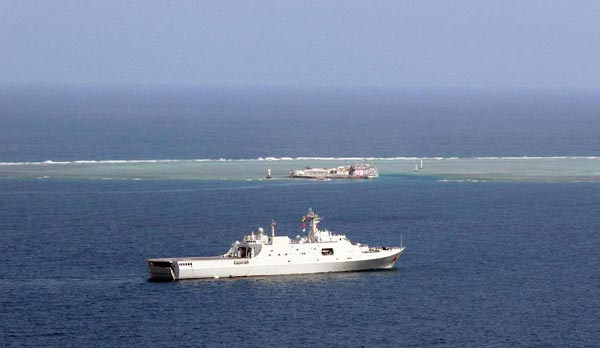 |
|
A formation of the Nanhai Fleet of China's Navy on Saturday finished a three-day patrol of the Nansha islands in the South China Sea. [Photo/Xinhua] |
Recent remarks from high-ranking US politicians on China's disputes in the South and East China seas with some of its neighbors breach the United States commitment not to take sides in the disputes. The US' inconsistency and capriciousness will only tarnish its own image and raise tensions in the region.
In a blatant interference in the South China Sea disputes on Thursday, US President Barack Obama said in Jamaica that China "is using its sheer size and muscle to force countries into subordinate positions".
Following Obama's logic, people cannot help asking: Isn't this what the US, the world's sole superpower, is doing?
In the South China Sea disputes, China is the victim because it has never seized a single islet in the waters from others, whereas countries such as the Philippines and Vietnam have occupied Chinese islands and islets for years.
It is more than annoying that these countries have pretended to be underdogs or even resorted to lies so as to mislead the public in the region and beyond. The support from outside forces, the US in particular, has emboldened these countries to initiate one provocation after another against China.
Last week in Jamaica, the US president continued to bolster these countries egos by alleging that "just because the Philippines or Vietnam are not as large as China doesn't mean that they can just be elbowed aside".
The US is using the same strategy with regard to China's territorial dispute with Japan in the East China Sea. US Defense Secretary Ashton Carter said the Diaoyu Islands fall under the scope of the US-Japan security treaty, in an interview with Japan's Yomiuri newspaper published on Wednesday.
As the US defense chief, Carter knows full well that the US bilateral security pact with Japan has no jurisdiction over the latter's disputes with another country.
It is crystal clear that Washington is using the regional disputes to interfere in regional affairs in a bid to salvage its waning influence in the Asia-Pacific.
All these irresponsible assertions from top US politicians mark a renewed US effort to stir up the troubled waters in Asia. This ill tendency will only complicate the situation and do a disservice to regional peace and stability.